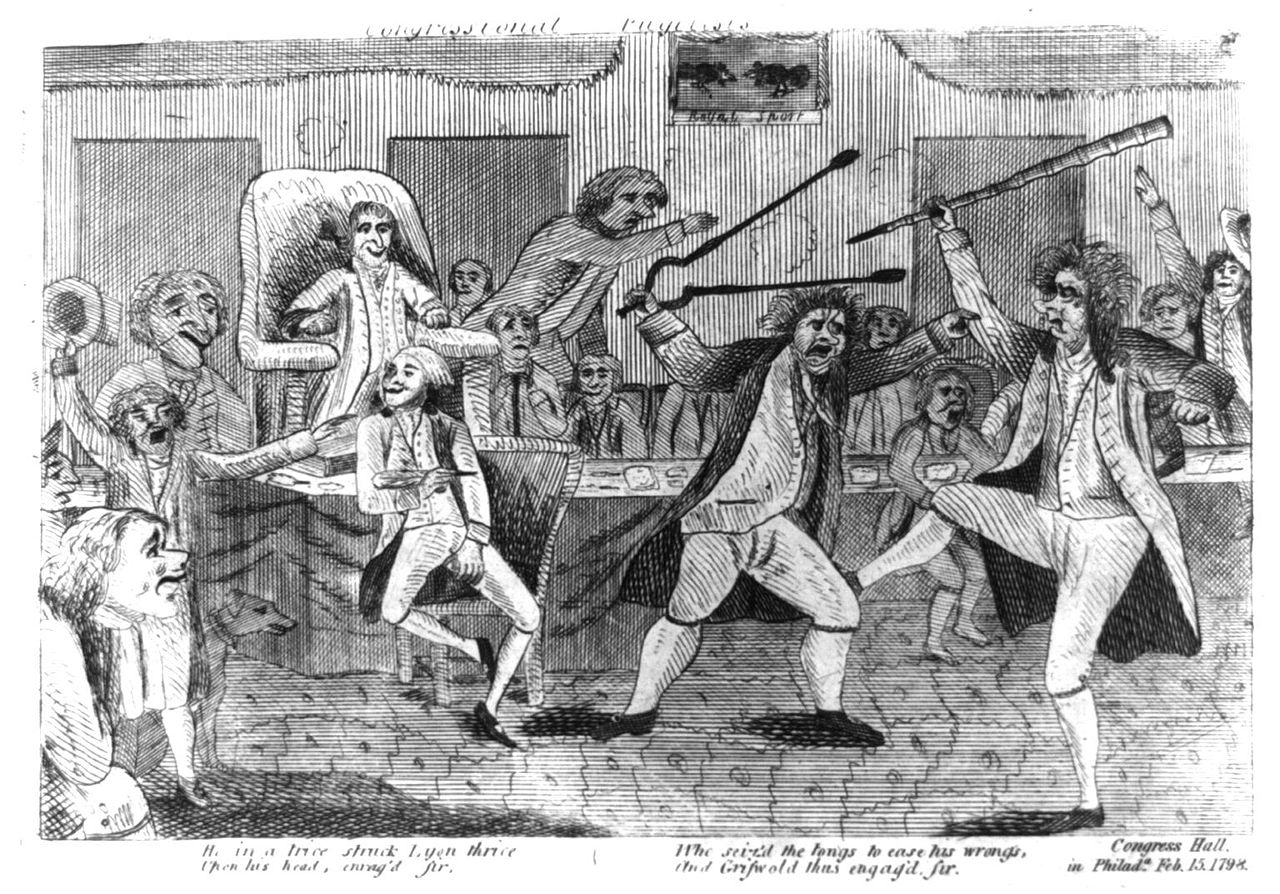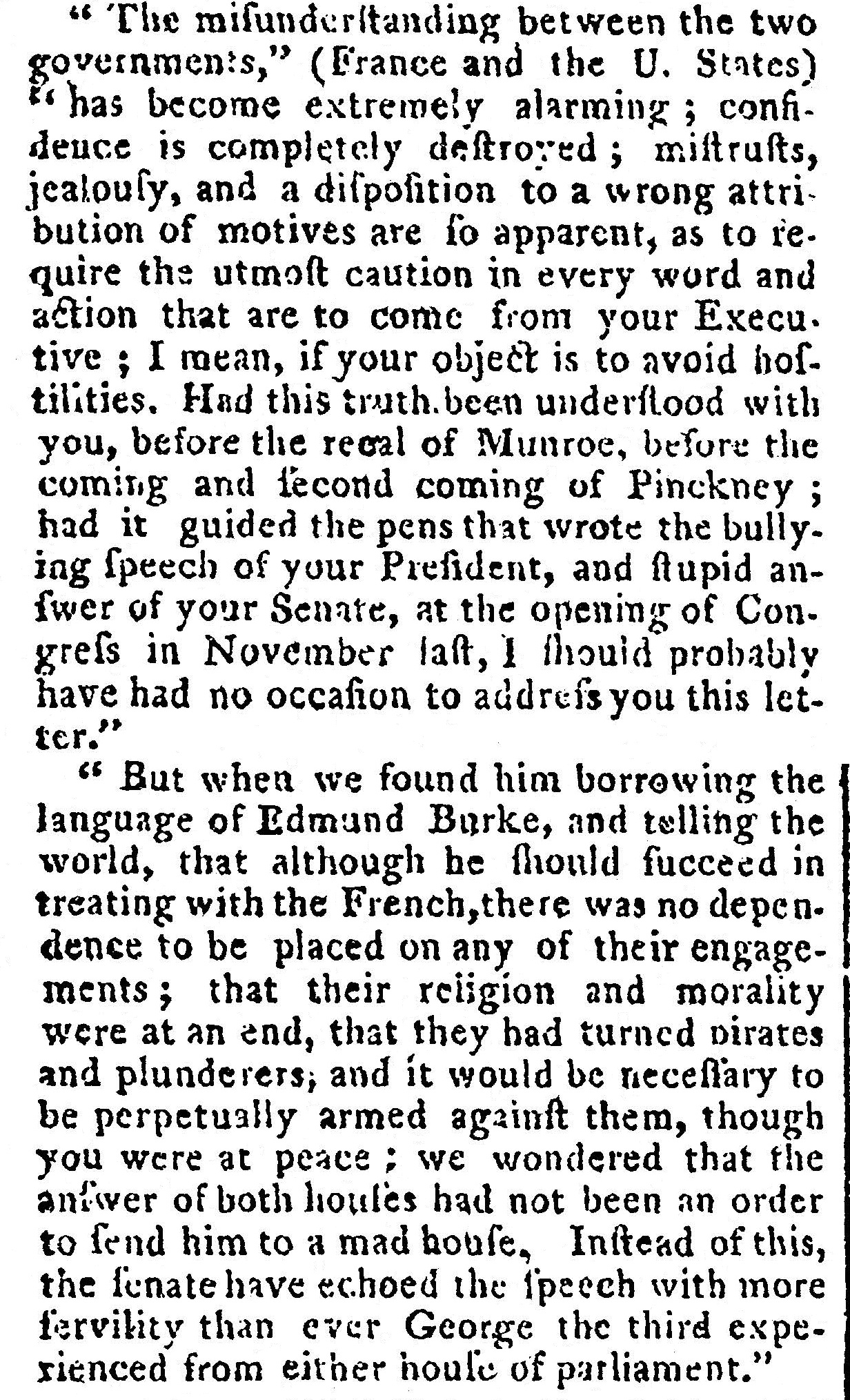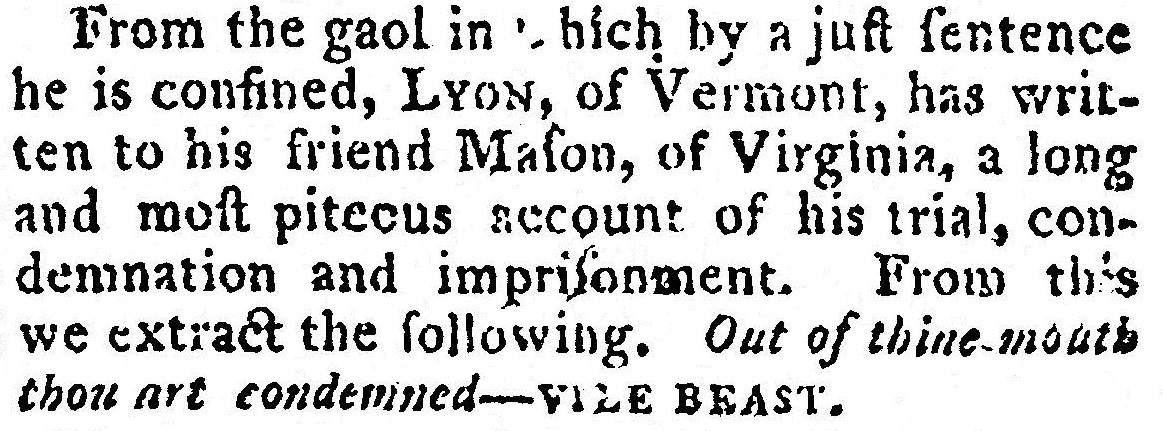‘Men of Meanness Preferred’: The 1798 Sedition Trial of Vermont Representative Matthew Lyon

Less than three months after President John Adams signed the Sedition Act into law on July 14, 1798, Vermont Congressman Matthew Lyon was accused of violating it. On July 31, 1798, Lyon published a letter in Spooner's Vermont Journal in which he criticized Adams personally and denounced the Adams administration’s handling of what would become known as the Quasi-War with France. Two months later Lyon’s criticisms of Adams appeared again, this time in a newspaper of his own creation, The Scourge of Aristocracy and Repository of Important Political Truth. Within the week Lyon was indicted, and on October 7 he was tried.
On October 11, 1798, the Vergennes Gazette reported Lyon had been charged with making “artful and indirect accusations of the President of the U. States, importing corruption in his appointment of men to office…” As published in the Vermont Journal, Lyon had written:
As to the Executive, when I shall see the efforts of that power bent on promotion of the comfort, the happiness and accommodation of the people, that Executive shall have my zealous and uniform support: But whenever I shall, on the part of the Executive, see every consideration of the public welfare swallowed up in a continual grasp for power, in an unbounded thirst for ridiculous pomp, foolish adulation, and selfish avarice; when I shall behold men of real merit turned out of office, for no other cause but independency of sentiment; when I shall see men of firmness, merit, years, abilities and experience, discarded in their applications for office, for fear they possess this independence, and men of meanness preferred, for the ease with which they take up and advocate opinions, the consequence of which they know but little of; when I shall see the sacred name of religion employed as a state engine, to make mankind hate and persecute one another, I shall not be their humble advocate.

The indictment against Lyon also included a charge for publishing a statement by “a diplomatic character in France” that was critical of the administration’s policy toward France as well as the U.S. Senate’s sycophancy to President Adams.
“The misunderstanding between the two governments,” (France and the U. States) “has become extremely alarming; confidence is completely destroyed; mistrusts, jealousy, and a disposition to a wrong attribution of motives are so apparent, as to require the utmost caution in every word and action that are to come from your Executive; I mean, if your object is to avoid hostilities. Had this truth been understood with you, before the repeal of Munroe, before the coming and second coming of Pinckney; had it guided the pens that wrote the bullying speech of your President, and stupid answer of your Senate, at the opening of Congress in November last, I should probably had no occasion to address you this letter.”
“But when we found him borrowing the language of Edmund Burke, and telling the world, that although he should succeed in treating with the French, there was no dependence to be placed on any of their engagements; that their religion and morality were at an end, that they had turned pirates and plunderers, and it would be necessary to be perpetually armed against them, though you were at peace; we wondered that the answer of both houses had not been an order to send him to the mad house. Instead of this the senate have echoed the speech with more servility than ever George the third experienced from either house of parliament.”

After requesting several postponements to secure council, Lyon was made to stand in his own defense. As reported by the Vergennes Gazette,
He began by stating that he should firstly contend that the court had no jurisdiction of the cause, for the Law of Congress was unconstitutional and void: 2ndly, that the publications were innocent; and thirdly, the truth of their contents.
The Vergennes Gazette continued:
The jury retired at eight o’clock in the evening, and brought in their verdict of “GUILTY” about nine.
After a few very pertinent and affecting remarks, the Judge pronounced sentence on him —that he be imprisoned Four Months, pay Costs and a Fine of One Thousand Dollars, and stand committed until the judgment should be complied with.
The Gazette then refuted Lyon’s claims of being hurried to trial, arguing “the public may rest assured, that both on Saturday and on Monday the Court several times told him the cause might be continued…,” and of facing an unfair jury, stating “the court at its last May session, ordered the clerk to summon the petit jury from the towns from which they actually came, so that it was impossible any reference could have been had to him.”

The Albany Gazette of November 19, 1798, was equally unsympathetic:
From the gaol in which by a just sentence he is confined, Lyon, of Vermont, has written to his friend Mason, of Virginia, a long and most piteous account of his trial, condemnation and imprisonment. From this we extract the following. Out of thine mouth thou art condemned – VILE BEAST.

The Albany paper then goes on to quote many portions of Lyon’s letter before, with seemingly no sense of irony, concluding:
Who does not rejoice to see suffering under the lash of a righteous law, the unprincipled hypocrite, who, under the mask of patriotism, can publish the most atrocious calumnies against a government that is our own choice, and that has given every evidence of integrity and wisdom?




